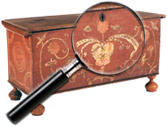J.C. Brown and the Forestville Manufacturing Company
Jonathan C. Brown (1807 to 1872) was one of a number of successful clockmakers and manufacturers in Bristol, Connecticut. He was active in the clockmaking business from around 1832 to 1855. In 1832, he bought into a firm with William G. Bartholomew, that became Bartholomew, Brown and Company, selling complete clocks. He was also one of the organizers of the Forestville Manufacturing Company with four partners – Bartholomew, William Hills, Chauncey Pomeroy, Jared Goodrich and Lora Waters. He was one of the organizers of the Forestville Manufacturing Company which made clocks in Forestville, Connecticut town from 1842 until 1848. Meanwhile, his firm changed names around 1840 and operated for two years as Hills, Brown and Company, at which point, Jonathan Brown bought out William Hills, making the firm J.C. Brown and Company.

A J.C. Brown “acorn” shelf clock, a style developed and produced by both J.C. Brown and the Forestville Manufacturing Company. (p4A item # D9876475)
While part of the Forestville Manufacturing Company, Brown developed what came to be known as the “acorn” shelf clock, which used a coiled spring-driven fusee-type movement, and these clocks were made by both Brown’s firm and the Forestville operation. A number of variations were developed, including one without the traditional serpentine side arms. (For further illustrations, see pg. 124 and 125 of The American Clock.) One interesting aspect of these clocks is that the painted tablets on a number of them depict Brown’s beautiful Greek Revival home in Bristol, which is still standing. The house was originally built for Lawson Ives, another Bristol clockmaker, in 1833.

A detail from the tablet of a J.C. Brown acorn shelf clock that depicts Brown’s home in Bristol, Connecticut. (p4A item # A023131)
J.C. Brown and Company operated from 1842 to 1849, while Forestville Manufacturing Company was also still in operation. In 1853, J.C. Brown, ever the entrepreneur, started a hardware business, which also sold a few clocks. The looming depression of 1857 and a bad fire caused all of Brown’s businesses to fail in 1855. He sold out the interests of his clockmaking businesses to E.N. Welch (who later form part of the Sessions Clock Company). Brown never returned to the clock business and died in 1872 in Nyack, New York.
As is apparent, dating these clocks can be very difficult, due to the variety of business names, clockmakers and timeframes involved.
Hollie Davis, p4A Senior Editor, June 29, 2009
